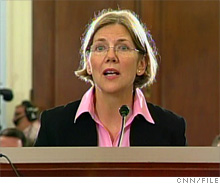TARP stemmed panic but left trail of woe
Congressional panel says bailout stabilized the financial markets but that it is failing to spur lending, stem foreclosures and prevent small bank failures.
 |
| Bailout watchdog head Elizabeth Warren gives the TARP a mixed review. |
WASHINGTON (CNNMoney.com) -- Was it worth it?
Fourteen months and $700 billion dollars later, did the federal TARP bailout do the job?
A bailout watchdog group, addressing those questions in a report released on Wednesday, gave the Troubled Asset Relief Program a mixed report card.
The Congressional Oversight Panel found that TARP stopped the financial panic and stabilized the banking system after the once-in-a-lifetime measure was hurriedly enacted in October 2008.
But, the panel wrote, the bailout failed to stem problems like lackluster lending and growing foreclosures that still plague the economy.
It even suggests that TARP may have done harm by making some banks and firms, considered too big for regulators to allow them to fail, even bigger and by creating a new expectation that big banks will always be saved.
"Implicit government guarantees pose the most difficult long-term problem to emerge from the crisis," the panel wrote.
The panel's chairwoman, Harvard University professor Elizabeth Warren, said the bailout program wins "high marks" for stabilizing the economy but still has a long way to go to meet other goals.
"The TARP program was not authorized for the sole purpose of bailing out large financial institutions," Warren told reporters. "Congress specifically states in the legislation that it expects the benefits will be to get ahead of the foreclosure crisis and to deal with the larger economic economic crisis. That hasn't happened."
TARP was enacted in October 2008 after only a few weeks of debate to stem a widespread investor run on the banking sector. It has been used to pump hundreds of billions into financial companies and automakers and to fund programs to spur lending and help troubled mortgage holders.
Questions about TARP's impact are top of mind in Washington as the Obama administration weighs whether to extend the bailout program into 2010.
Many expect it will be renewed so it can be used to fund relatively new programs aimed at helping small businesses and homeowners.
President Obama on Tuesday cited the less-than-expected cost of TARP to free up dollars to help pay for new job-growth programs.
But Republican lawmakers want the bailout program brought to a close and the money returned to pay down the federal deficit. Many have filed bills or amendments to regulatory reform legislation seeking to end TARP.
The one Republican lawmaker on the Congressional Oversight Panel, Rep. Jeb Hensarling, R-Texas, voted against the five-member oversight panel's conclusions.
Hensarling, in a dissenting opinion, said that TARP is a failure that needs to be shut down.
"If TARP is not wound-up on Dec. 31, 2009, and the money repaid to the Treasury, the abuses of the TARP program as evidenced by the Chrysler, GM and GMAC bailouts, misguided foreclosure mitigation programs and the re-animation of reckless behavior and moral hazard risks created by the administration's lending-for-the-sake-of-lending programs will only grow," Hensarling said in a statement.
The main committee report lays out key areas where TARP has missed its mark:
- Many consumers and business are still having trouble getting loans
- Banks are still failing at a fast pace
- Toxic assets remain on balance sheets of large banks
- Foreclosures continue to grow
- Jobs remain scarce
Warren said she was particularly disappointed in the progress in the bailout's mortgage modification program, citing recent data that only 4.69% of temporary loan modifications have been made permanent.
"This program is not working to stem the foreclosure crisis," Warren said. "This program will deal with 3 to 4 million foreclosures but current predictions put us at 8 to 13 million foreclosures."
Oversight panel member Damon Silvers, associate counsel of the AFL-CIO, wrote in the report that he was particularly concerned that small banks, lacking the same implicit public guarantees that big banks enjoy, are "failing at an alarming late."
"TARP was a success at stabilizing a serious financial crisis," he wrote. "But, it has been characterized by a willingness to give public money to the banks at less than fair terms to the public and by a refusal to resolve the fundamental problems with the financial institutions it has rescued."
The panel did not offer a recommendation about whether the Treasury Department should extend TARP another year. But it did reiterate an ongoing recommendation that Treasury officials be more transparent about their decision-making processes.
"Transparency and accountability may be painful in the short run, but in the long run they will help restore market functions and earn the confidence of the American people," the report said.
Treasury Secretary Tim Geithner is set to testify before the panel on Thursday at a hearing on Capitol Hill. ![]()

